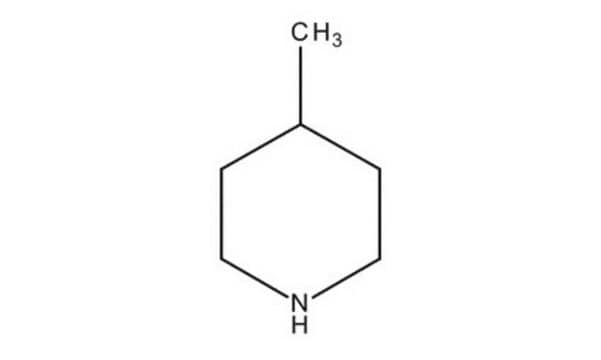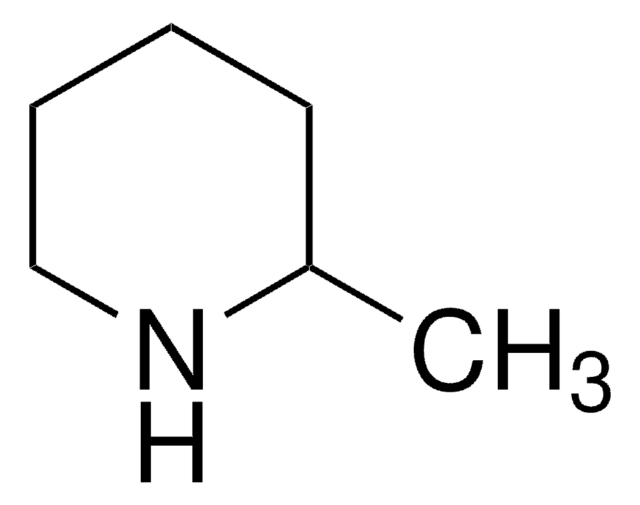792152
4-Methylpiperidine solution
suitable for peptide synthesis, 20 % (w/w) in DMF
Sinónimos:
4-Methylpiperidine solution
Iniciar sesiónpara Ver la Fijación de precios por contrato y de la organización
About This Item
Fórmula empírica (notación de Hill):
C6H13N
Número de CAS:
Peso molecular:
99.17
MDL number:
UNSPSC Code:
12352100
PubChem Substance ID:
NACRES:
NA.22
form:
liquid
assay:
≥95.5%
Productos recomendados
assay
≥95.5%
Quality Level
form
liquid
reaction suitability
reagent type: reductant
concentration
20 % (w/w) in DMF
refractive index
n20/D 1.433
density
0.920 g/mL at 25 °C
application(s)
peptide synthesis
SMILES string
N1CCC(CC1)C
InChI
1S/C6H13N/c1-6-2-4-7-5-3-6/h6-7H,2-5H2,1H3
InChI key
UZOFELREXGAFOI-UHFFFAOYSA-N
Application
4-Methylpiperidine solution (20 % in DMF) can be used:
- In the deprotection of F-moc protecting group which is attached to free amine.
- In the determination of resin-bound amino acid by UV-Fmoc-quantitation.
signalword
Danger
Hazard Classifications
Acute Tox. 4 Dermal - Acute Tox. 4 Inhalation - Eye Dam. 1 - Flam. Liq. 3 - Repr. 1B - Skin Corr. 1B
Storage Class
3 - Flammable liquids
wgk_germany
WGK 3
flash_point_f
98.8 °F - closed cup
flash_point_c
37.1 °C - closed cup
Elija entre una de las versiones más recientes:
¿Ya tiene este producto?
Encuentre la documentación para los productos que ha comprado recientemente en la Biblioteca de documentos.
Design, solid-phase synthesis and evaluation of enterobactin analogs for iron delivery into the human pathogen Campylobacter jejuni
Zamora CY, et al.
Bioorganic & Medicinal Chemistry, 26(19), 5314-5321 (2018)
A sensitive and practical colorimetric test for polymer-supported hydroxyl and thiol groups
Caroen J and Van der EJ
Tetrahedron Letters, 50(1), 41-44 (2009)
Biljana Mojsoska et al.
Antimicrobial agents and chemotherapy, 59(7), 4112-4120 (2015-05-06)
The constant emergence of new bacterial strains that resist the effectiveness of marketed antimicrobials has led to an urgent demand for and intensive research on new classes of compounds to combat bacterial infections. Antimicrobial peptoids comprise one group of potential
Leopold Kong et al.
Journal of molecular biology, 427(16), 2617-2628 (2015-07-03)
Hepatitis C virus (HCV) is a positive-strand RNA virus within the Flaviviridae family. The viral "spike" of HCV is formed by two envelope glycoproteins, E1 and E2, which together mediate viral entry by engaging host receptors and undergoing conformational changes
Nuestro equipo de científicos tiene experiencia en todas las áreas de investigación: Ciencias de la vida, Ciencia de los materiales, Síntesis química, Cromatografía, Analítica y muchas otras.
Póngase en contacto con el Servicio técnico












